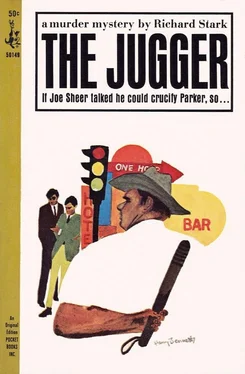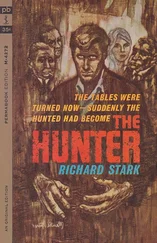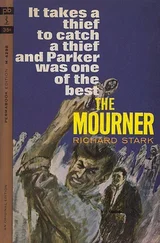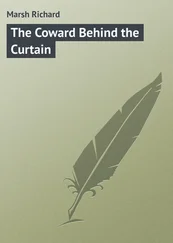When he got to the house it was all in darkness, though it was only a little after eight. He stood on the porch and rang the doorbell, telling himself that senile old men sometimes sat in the dark and sometimes took evening naps, and then a teenage kid called him from the porch of the house next door and told him Mr. Shardin had died yesterday, yes, the funeral was to be tomorrow morning, yes, it was all very sudden.
Too sudden.
Parker went back to the hotel room to think it out. By the time he’d received that second letter from Joe, the old man had already been dead. What had happened to him? What sort of trouble had he been talking about? Was it anything that could eventually get back to Parker? He remembered, in that first letter, Joe had made a point of saying he’d have to cut out the messenger service until after he got everything straightened out.
Joe was dead, but that didn’t solve everything after all. Parker still had to know how Joe had died, and who had been causing what kind of trouble, and if there was now anyone in the town of Sagamore who could later on cause trouble for Parker or Charles Willis. He had to know now, and not wait for it to come looking for him, because then it would be too late.
So he stayed over that night, and in the morning he went down and asked the desk clerk about the local paper, but the local paper was a weekly that came out on Thursday, so what Parker wanted was the district paper, and the district paper office was over in Lynbrooke, seven miles away.
Across the street from the hotel was the railroad station, and in front of it was parked a taxi, a dusty black Chevrolet four or five years old. Parker hired it to take him to Lynbrooke and back. He rode out there and picked up yesterday’s paper. When he came out of the newspaper office there was a black Ford parked behind the Chevy, and a stocky man in brown business suit and tan cowboy hat was leaning against the side of the Chevy, talking in a lazy way with the driver sitting behind the wheel. He went away when Parker came along, and Parker saw him get into the black Ford.
Riding back to Sagamore, the black Ford stayed on their tail. After a couple of miles, Parker said to the driver, “Who’s the guy in the cowboy hat?”
“Him? The guy talking to me?” The driver was in his late twenties, wearing an Army Ike jacket and too-long dry blond hair. A dark inverted V on the sleeve of the jacket showed where he’d stripped off the insignia of the highest rank he’d ever held: Pfc. He had a sharp narrow face, with the bone structure clear and plain around the hollows of the eyes. When he spoke, old frustrations trembled behind his voice.
Parker said, “He smelled like law. Is he?”
“You could say that.”
“What kind of law?”
“The rotten kind.”
“I mean what level. State, local, county, what is he?”
“Town. He runs the town police force, in Sagamore.”
Parker flicked his cigarette out of the window. “How big’s the town police force?”
The driver shrugged. “Maybe twelve, fifteen men, I don’t know.”
“Big responsibility. What do they call him, commissioner?”
“Captain. He’s got a couple lieutenants and everybody else is sergeants.”
Parker frowned. The driver was willing enough to talk but he didn’t know how. It was like pulling teeth, getting anything from him. He said, “This captain, he got a name?”
“Younger, Captain Younger.”
“What did he want to know about me?”
“Who said he wanted to know about you? We were just talking.”
“Sure.” Parker shrugged, and looked back. The Ford was indolently behind them. He said, “How come you aren’t one of his sergeants?”
The driver didn’t say anything for a minute. He hunched over the wheel more than he had, and the Chevy picked up speed. But after a few seconds the speed slackened off again, and the driver said, so low that Parker could barely hear it, “I got a job.”
“Sure.”
After that they rode in silence, back to Sagamore and the hotel. Then, as Parker was paying him, the driver said quickly, “He wanted to know did I know your name, did you say anything on the way out, had I ever seen you around town before anywhere, did you say what you wanted from the district paper, did you mention any names at all.”
“Thanks.”
“Even if I’d known anything, I wouldn’t have told that bastard.”
Parker got out of the car and stood a second while the driver took the Chevy around a sweeping U-turn and put it in its parking slot across the street in front of the railroad station.
The Ford pulled to the curb a few yards to Parker’s left. Captain Younger climbed heavily out of it, pulled a handkerchief from his hip pocket, took off his cowboy hat, wiped his forehead and the sweatband with the handkerchief, and put hat and handkerchief back where he’d got them. Out of his inside coat pocket he pulled a cigar and made a long ceremony out of unwrapping it and getting it ready to smoke. He didn’t look at Parker at all.
Parker turned and went on into the hotel. It was a small building, only four stories high, but spread out in a rambling manner, and with a lobby far too broad and long for the rest of the place. Green leather sofas were scattered here and there over the dark orange carpeting in the lobby, and at the far end one lone man stood like a joke behind the broad sweep of desk.
Parker went upstairs, and Captain Younger stayed on plant out in front of the hotel.
Then, everywhere else Parker went, it kept coming back to Captain Younger, and it wound up in Joe Sheer’s house, the two of them face to face, Parker and Captain Younger, and Parker still didn’t know a damn thing.
Except he had trouble.
Dr. Rayborn was a poor liar, but a good doctor. He didn’t ask any questions, either of Captain Younger or Parker, but went right to work on Parker’s face. He cleaned the bruises with cotton, and put a stinging ointment on a couple of the worst places, and then sprayed something on the side of his face out of a pressurized can. The spray was freezing cold at first, but it cut through the pain and gradually numbed the side of Parker’s face like Novocain.
All through it, nobody talked. Younger watched Parker and Parker watched the doctor, and the doctor watched his own hands. He wouldn’t meet anybody’s eye. Through his efficiency, nervousness glittered, like the sky seen through an intermittent overcast.
When at last he was finished and putting his tools back in his black bag, Younger said to him, “This is just between us fellas, Larry.”
Not looking up from his bag, the doctor said, “This is the end, Abner, the last straw. No more. Don’t call me again.”
“ I didn’t do that to him,” Younger said. “He fell downstairs. Isn’t that right, Willis?”
Parker didn’t say anything.
Dr. Rayborn said, “He didn’t get that from falling downstairs. Don’t lie to me, Abner, I’m not a fool.”
“Well, I say I didn’t do it. God damn it, Willis, did I lay a hand on you?”
Still Parker didn’t say anything. Face expressionless, he watched the two of them. Sooner or later he’d want another private talk with Dr. Rayborn, the weak link.
The doctor was saying, “I don’t care about the details, Abner. I don’t want to know about them. I didn’t want to know about—”
“Shut your mouth!”
The doctor was suddenly twice as nervous. He shut his bag with a loud click, and his eyes kept darting over to look at Parker. Parker watched him with flat expressionless eyes.
Younger said, “You’re gonna get yourself in trouble.” He pointed a finger at the doctor and jabbed the finger in the air. ‘You’re gonna get everybody in trouble. Now, you just watch yourself.”
Читать дальше












